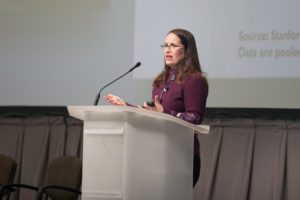
Data and trends will advance new Grow Our Own work across the region
February 15, 2017
HUTCHINSON, Minn.—The University of New Hampshire’s Carsey School of Public Policy released a new report, “A Profile of Youth Poverty and Opportunity in Southwestern Minnesota,” commissioned by Southwest Initiative Foundation (SWIF). The report provides data and trends that can guide regional and community work to support kids.
The report is authored by Marybeth J. Mattingly, Andrew Schaefer and Douglas Gagnon. Mattingly is director of research on vulnerable families at the Carsey School of Public Policy and a research assistant professor of sociology at the University of New Hampshire. She presented at the Grow Our Own Summit December 15 in Marshall, which launched SWIF’s new focus on closing the “opportunity gap” faced by today’s youth. Across the country, including in southwestern Minnesota, the division of economic classes is widening and children born into poor families are unable to access the opportunities they need to become successful.
The researchers analyzed data on various demographic, economic, educational and social indicators. Wherever possible, they compare conditions in southwestern Minnesota to the state and nation. As in the U.S. as a whole, this region’s income gap is increasing.
“The gap in family income between families at the top and bottom of the income spectrum has increased over the past several decades in southwestern Minnesota,” Mattingly said.
Key findings include that 11,000 southwest Minnesota children—17 percent, or approximately one in six—live in poverty. An additional 23 percent of children live in low-income families. According to the report, this means more than four in 10 children in southwestern Minnesota live in families that are likely struggling to meet their basic needs.
The report sites numerous studies that show children who experience poverty early in life are at risk for serious physical and mental health issues. They also are at risk for lower cognitive scores, academic achievement and increased behavioral problems.
“Although high school students in southwestern Minnesota report experiencing a number of risk factors at or below state rates, trends in parental incarceration are concerning,” Mattingly said. “18.9 percent of southwestern Minnesota high school students report that a parent has been in jail or prison, a rate 2.5 percentage points higher than for other high school students in the state.”
A challenge for the region as a whole is language abilities. The report shows southwestern Minnesota’s foreign-born population has grown since 2000 and many of these residents struggle with English-language proficiency. In southwestern Minnesota, 12 percent are unable to speak any English, nearly double the state as a whole.
“In light of the challenges facing southwestern Minnesota, it is important to highlight opportunities for success.” Mattingly said. “For example, southwestern Minnesota is starting from a position of relative strength in terms of poverty and youth engagement compared to the nation as a whole. Preserving and protecting this advantage should be a high priority for policymakers and service providers in the region.”
The report also indicates that southwestern Minnesota’s smaller populations mean that relatively small investments can make a significant impact for disadvantaged populations.
SWIF will use information in this report to guide community conversations about the opportunity gap and local strategies to close it. Download the complete report at swifoundation.org.
“We hope our partners find this report to be a valuable tool as we work together, supporting all of our kids,” said SWIF President/CEO Diana Anderson. “Southwest Initiative Foundation will be thoughtful as we move forward with the Grow Our Own work. We want to support proven, data-driven solutions here in our region, as well as introduce southwest Minnesota to evidenced-based strategies that can fit our communities’ unique needs.”
SWIF sees this work as true economic development, ensuring that all kids can fully participate in the growth and prosperity of southwest Minnesota.
“These kids sit in our classrooms today and will come to work in and run our businesses tomorrow,” Anderson said. “They will need to fill the many roles that keep our communities strong and vibrant. We must give all kids the best possible start.”
Collaborating with educators, community members, employers, elected officials, students, faith communities and leaders from within growing diverse communities will remain a top priority for SWIF. SWIF staff are available to present the Grow Our Own work and regional report with local groups. Contact Nancy Kaping at 800-594-9480 or [email protected] to request a presentation.
###



